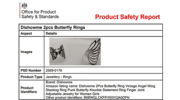Large-scale extortion scam threatens Aussies—are you at risk?
By
Gian T
- Replies 7
In an age where our digital footprints are as real as our physical ones, it's no surprise that cybercriminals are finding increasingly sophisticated ways to exploit vulnerabilities.
The latest urgent warning from Scamwatch is a stark reminder that no one is immune to the threat of online scams, with hundreds of Australians falling prey to a particularly vile extortion scheme.
The scam, which has seen a worrying surge in reports, involves perpetrators sending bulk extortion emails to unsuspecting individuals.
These criminals claim to have hacked into personal computers, alleging they have obtained 'compromising' images and videos.
The threat is clear: pay a ransom in cryptocurrency to a specified address or see your most private moments shared with friends and family.
But here's the twist—Scamwatch has found no evidence that these scammers have hacked their targets or accessed any such compromising material.
Instead, they're using fear tactics, bolstered by personal details such as birth dates and home addresses, to intimidate victims into paying up.
These details are likely sourced from previous public data breaches.
ACCC deputy chief Catriona Lowe has emphasised the need for Australians to be extra vigilant in this emerging trend.
'The fictional threats in these emails combined with the inclusion of people's data are intended to terrify the individual reading it,' Ms Lowe stated.
'It's extortion, and it's a crime.'
The National Anti-Scam Centre is actively working to disrupt this scam and support those affected in collaboration with law enforcement and IDCARE.
The advice to anyone who receives such a suspicious email is unequivocal: ignore or delete it immediately.
Engaging with the scammer or providing money or personal information only deepens the risk.
If you become a victim of this scam and accidentally hand over money or personal details, it's crucial to act fast.
Contact your bank or card provider immediately to report the scam and halt any transactions.
In other news, Services Australia warned about scams offering fake ‘bonus’ cash payments supposedly to help with cost-of-living pressures.
Scammers are trying to attract individuals with false claims of extra Centrelink payments, aiming to steal personal information. You can read more about it here.

Have you or someone you know encountered this scam? What steps do you take to protect your online personal information from scams? Share your experiences in the comments below.
The latest urgent warning from Scamwatch is a stark reminder that no one is immune to the threat of online scams, with hundreds of Australians falling prey to a particularly vile extortion scheme.
The scam, which has seen a worrying surge in reports, involves perpetrators sending bulk extortion emails to unsuspecting individuals.
These criminals claim to have hacked into personal computers, alleging they have obtained 'compromising' images and videos.
The threat is clear: pay a ransom in cryptocurrency to a specified address or see your most private moments shared with friends and family.
But here's the twist—Scamwatch has found no evidence that these scammers have hacked their targets or accessed any such compromising material.
Instead, they're using fear tactics, bolstered by personal details such as birth dates and home addresses, to intimidate victims into paying up.
These details are likely sourced from previous public data breaches.
ACCC deputy chief Catriona Lowe has emphasised the need for Australians to be extra vigilant in this emerging trend.
'The fictional threats in these emails combined with the inclusion of people's data are intended to terrify the individual reading it,' Ms Lowe stated.
'It's extortion, and it's a crime.'
The National Anti-Scam Centre is actively working to disrupt this scam and support those affected in collaboration with law enforcement and IDCARE.
The advice to anyone who receives such a suspicious email is unequivocal: ignore or delete it immediately.
Engaging with the scammer or providing money or personal information only deepens the risk.
If you become a victim of this scam and accidentally hand over money or personal details, it's crucial to act fast.
Contact your bank or card provider immediately to report the scam and halt any transactions.
In other news, Services Australia warned about scams offering fake ‘bonus’ cash payments supposedly to help with cost-of-living pressures.
Scammers are trying to attract individuals with false claims of extra Centrelink payments, aiming to steal personal information. You can read more about it here.
Key Takeaways
- An urgent warning has been issued about a large-scale extortion email scam targeting Australians.
- Scammers claim to have compromising images and videos of the victims and demand payment in cryptocurrency.
- Scamwatch and the ACCC advise that there is no evidence of actual hacking, and personal data likely comes from previous breaches.
- Australians are advised to ignore the scam emails, not give any money or information, and report to Scamwatch if targeted.
Last edited:









